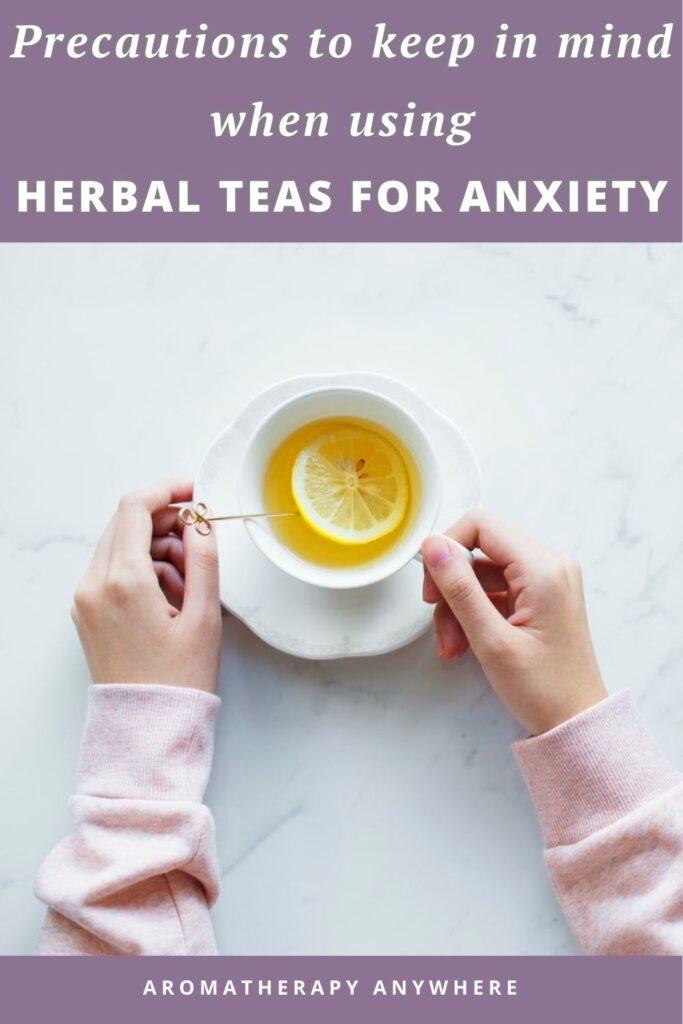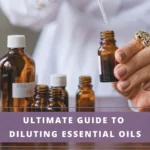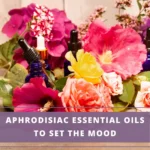As an Amazon Associate I earn from qualifying purchases. See Full Disclosure Here
Anxiety has become a common concern today – brought on by several factors outside of our control. While seeking professional help is crucial, incorporating natural remedies such as herbal teas for anxiety can offer much-needed additional support.
Herbal teas for anxiety have long been cherished for their calming properties and the presence of certain components that promote relaxation and tranquility.
How Herbal Teas Work To Calm Anxiety
 Herbal teas work in a couple of different ways to induce peace and calm.
Herbal teas work in a couple of different ways to induce peace and calm.
The main reason for their effectiveness is that herbal teas contain components that work to support the nervous system and induce peace and calm.
The second reason is the very act of drinking this delicious brew. In fall and winter, sipping on the warm, flavored liquid feels immensely comforting and satisfying.
In spring and summer, you can keep a pot of brewed herbal tea in the refrigerator for a refreshing, flavorful drink.
After reading research studies and experimenting with various brews, I’ve collated a list of the top 10 herbal teas for anxiety.
From their beneficial components to the brewing process, you’ll find everything you need to know to incorporate these natural remedies into your daily routine including potential safety issues.
Top 10 Herbal Teas To Calm Anxiety
 1. Chamomile Tea
1. Chamomile Tea
Chamomile tea is widely recognized for its calming properties and gentle sedative effect, making it a popular choice for anxiety relief.
The brew is made from chamomile flowers, which are rich in flavonoids such as apigenin and bisabolol. Both ingredients are known for helping reduce anxiety and promote relaxation.
Chamomile is considered the best herbal tea for sleep because of its strong sedative properties. But these very properties make it the wrong option when you need to stay awake.
It’s best to avoid drinking chamomile tea for anxiety if you have a meeting or a long drive ahead of you.
To make chamomile tea, steep 2 teaspoons of dried organic chamomile flowers in 1 cup of hot water for 5-10 minutes before straining the flowers. Or steep 1 chamomile tea bag in water for 2-3 minutes.
Enjoy this delicious brew before bedtime to calm anxiety and get a peaceful night’s sleep.
See the whole list of chamomile tea benefits and delicious chamomile tea recipes using dried flowers as the main ingredients.
2. Lavender Tea
Lavender tea is known for its soothing aroma and anxiety-reducing effects.
This aromatic herbal tea contains linalool and linalyl acetate, which reduce anxiety through their calming effects on the nervous system.
Steep 1 tablespoon of dried organic lavender flowers in 1 cup of hot water for about 4-5 minutes, strain the flowers and savor the delicate flavor of the infusion. If you prefer your herbal teas on the sweeter side, try these honey lavender tea bags.
It’s easy to brew a cup of lavender tea and sip on it any time you’re feeling stressed or anxious.
Get more details on Lavender tea benefits + How to make lavender tea from dried flowers & recipes to customize your brew.
3. Lemon Balm Tea
Known for its ability to promote calmness and reduce nervousness, lemon balm tea deserves special mention.
Lemon balm leaves contain rosmarinic acid and flavonoids that contribute to the herb’s anxiolytic effects.
To prepare lemon balm tea, steep 1-2 teaspoons of organic dried lemon balm leaves in 1 cup of hot water for 5 minutes. Strain and enjoy the citrusy and refreshing taste
For an easier alternative, use these organic Stay Well tea bags, which contain a mixture of lemon balm, elderberries, and ginger. All three ingredients are known for their potent immune-boosting properties too.
4. Ashwagandha Root Tea
Ashwagandha is widely used in Ayurvedic medicine for its stress-reducing and anxiety-relieving effects. It is also known as winterberry or Indian ginseng.
This adaptogenic herb contains compounds such as withanolides that support the body’s stress response.
To make ashwagandha tea, mix 1 teaspoon of organic ashwagandha root powder or ashwagandha root cut and sifted in 1 cup of hot water. Let it steep for 4-5 minutes, strain, and drink it in the morning or evening. The brew has an earthy and slightly bitter flavor.
Note: Consult a healthcare professional before using ashwagandha if you have any underlying health conditions or take: medications.
5. Peppermint Tea
Peppermint tea has a refreshing, minty flavor and an invigorating aroma, both of which awaken and uplift your senses.
The anxiety-relieving properties of properties stem from its rich menthol content, which has a calming effect on the body and mind.
Steep 1-2 teaspoons of dried organic peppermint leaves in 1 cup of hot water for about 2 minutes. Strain and enjoy the refreshing and minty flavor. For a quicker brew, use these organic peppermint-leaf tea bags.
Sip on peppermint tea whenever you need a moment of tranquility. Peppermint is the best herbal tea to drink when you need to stay alert, such as before a long drive or an important meeting.
Avoid drinking this tea around bedtime as it hinders the sleep process and will keep you awake.
6. Holy Basil or Tulsi Tea
Holy basil, also known as tulsi, is considered an adaptogen that helps the body adapt to stress. It contains eugenol and rosmarinic acid, which have anxiolytic effects.
To make a cup of tulsi tea, add 1 teaspoon of dried organic tulsi leaves to a cup of hot water. Steep for 3 minutes, strain, and enjoy the aromatic and slightly spicy flavored brew. For a quicker option, use these organic tulsi tea bags.
With these organic tulsi-ginger tea leaves, you’ll get a mild-bodied brew with a predominately ginger flavor, a hint of citrus, and spicy undertones from tulsi.
7. Green Tea
Green tea contains L-theanine, an amino acid that promotes relaxation and reduces anxiety. It is also rich in antioxidants that provide overall health benefits.
Green tea is known to provide an energy boost and promotes relaxation without drowsiness, much like peppermint tea. Avoid drinking this tea around bedtime.
To make green tea, steep 1 teaspoon of green tea leaves in hot water (80°C/176°F) for 2-3 minutes. Strain and enjoy with a dash of honey, lemon, or ginger.
8. Valerian Root Tea
Valerian root tea is widely used as a natural remedy for anxiety and insomnia. This root is rich in two compounds – Valerenic acid and valerenol – which are known to increase gamma-aminobutyric acid (GABA) levels in the brain, helping to reduce anxiety.
To make valerian root tea, steep 1-2 teaspoons of dried organic valerian root in hot water for 5 minutes. Strain and enjoy the earthy taste.
Sip this herbal tea for anxiety before bedtime for optimal results.
9. Ginseng Tea
Ginseng is a popular herb used in traditional Chinese medicine to enhance well-being and reduce anxiety. It contains ginsenosides, which have adaptogenic properties and can help modulate the stress response.
To make ginseng tea, add 1 teaspoon of dried ginseng root slices or ginseng root powder to a cup of hot water. Let it steep for 3-4 minutes, strain, and enjoy the slightly sweet and earthy taste.
10. Herbal Tea Blends For Anxiety
Using a combination of herbal teas for anxiety can also offer your taste buds a delightful sensory experience while also helping to calm your anxiety.
You can make your own blend or buy these pre-made varieties.
1. Chamomile and Lavender Blend: Chamomile and lavender are known for their calming properties and can help promote relaxation and reduce anxiety. The addition of licorice lends an interesting twist to this blend.
2. Lemon Balm and Passionflower Blend: Lemon balm and passionflower have both been traditionally used to relieve stress and anxiety. This blend can help promote a sense of calmness.
3. Peppermint and Lemon Verbena Blend: Peppermint has soothing properties and can help ease tension, while lemon verbena is known for its calming effects on the nervous system. This blend can provide a refreshing and calming experience.
4. Valerian Root and Catnip Blend: Valerian root is often used as a natural remedy for anxiety and sleep disorders, while catnip has mild sedative properties. This combination can help promote relaxation and reduce anxiety symptoms.
5. Ashwagandha and Holy Basil Blend: Ashwagandha is an adaptogenic herb that can help the body cope with stress, while holy basil (also known as tulsi) is known for its calming and balancing effects. This blend can support overall well-being and reduce anxiety.
6. Lemon Balm and Chamomile Blend: Lemon balm and chamomile both have soothing properties and can help calm the mind and reduce anxiety. This blend is often used to promote relaxation and better sleep.
Precautions When Using Herbal Teas for Anxiety
 While herbal teas can be a wonderful addition to your anxiety relief routine, it’s essential to keep a few precautions in mind:
While herbal teas can be a wonderful addition to your anxiety relief routine, it’s essential to keep a few precautions in mind:
Moderation is key
While herbal teas are generally safe, it’s crucial to consume them in moderation.
Avoid excessive consumption, as it may lead to unwanted effects or interactions with medications.
Follow recommended dosages and guidelines provided with the herbal tea products.
Check Quality and sourcing
As a rule, always purchase herbal teas from reputable sources to ensure their quality and safety. You never want to compromise on this aspect as low-grade varieties will only exacerbate your symptoms.
Organic and sustainably sourced teas are generally preferred to minimize exposure to pesticides and contaminants.
Watch for allergic ingredients
If you have known allergies or sensitivities, carefully read the labels of herbal teas or consult an herbalist to ensure there are no potential allergens present in the tea you choose.
Safety during pregnancy and breastfeeding
Exercise caution, or better still, avoid herbal teas completely if you are pregnant or breastfeeding. Some herbs may not be suitable during these stages due to potential effects on hormones or the developing fetus.
As always, when in doubt, it’s best to consult with a healthcare professional for guidance specific to your situation.
Consult a healthcare professional
If you have underlying health conditions, are pregnant or breastfeeding, or are currently taking any medications, you must consult with a healthcare professional before incorporating herbal teas into your routine. They can provide personalized advice and ensure there are no contraindications.
Other Natural Ways to Calm Anxiety
In addition to herbal teas, there are a few other natural techniques that can help calm anxiety:
Deep breathing exercises: Practice deep breathing techniques such as diaphragmatic breathing or the 4-7-8 breathing method to promote relaxation and reduce anxiety.
Aromatherapy: Inhale the aroma of essential oils known for their calming properties, such as lavender, chamomile, or bergamot. Read the full list of the best essential oils for anxiety with details on how to use them.
Mindfulness and meditation: Incorporate mindfulness practices and meditation into your daily routine. These techniques can help quiet the mind, reduce anxiety, and promote a sense of calm.
Regular exercise: Physical activity releases endorphins, which reduces stress hormones, and improves overall well-being and that ‘feel-good’ factor. Engaging in regular physical exercise of any type can be very effective at boosting your self-confidence and keeping anxiety at bay.
Healthy lifestyle habits: Maintain a balanced and nutritious diet, get sufficient sleep, limit caffeine and alcohol consumption, and prioritize self-care activities that bring you joy and relaxation.
Herbal teas offer a natural and soothing way to alleviate anxiety and promote relaxation. Whether you choose chamomile, lavender, lemon balm, or ashwagandha tea, each of these herbal remedies has its unique set of ingredients and benefits.
Experiment with different single-leaf teas and tea blends to find the ones that resonate with you the most. Sit back, sip, and let the calming effects of these teas help restore balance and tranquility to your mind and body.
Last but not least, remember that while natural remedies such as herbal teas and other techniques can be beneficial, it’s important to seek professional help if anxiety symptoms persist or worsen. Each individual is unique, and what works for one person may not work for another.
Listen to your body and explore different approaches to find what brings you the relief and support that you’re looking for.
 Disclaimer: This information is not intended to serve as medical advice. Please consult your doctor before using any natural medication or if you experience any unusual symptoms. See Full Disclaimer here.
Disclaimer: This information is not intended to serve as medical advice. Please consult your doctor before using any natural medication or if you experience any unusual symptoms. See Full Disclaimer here.









